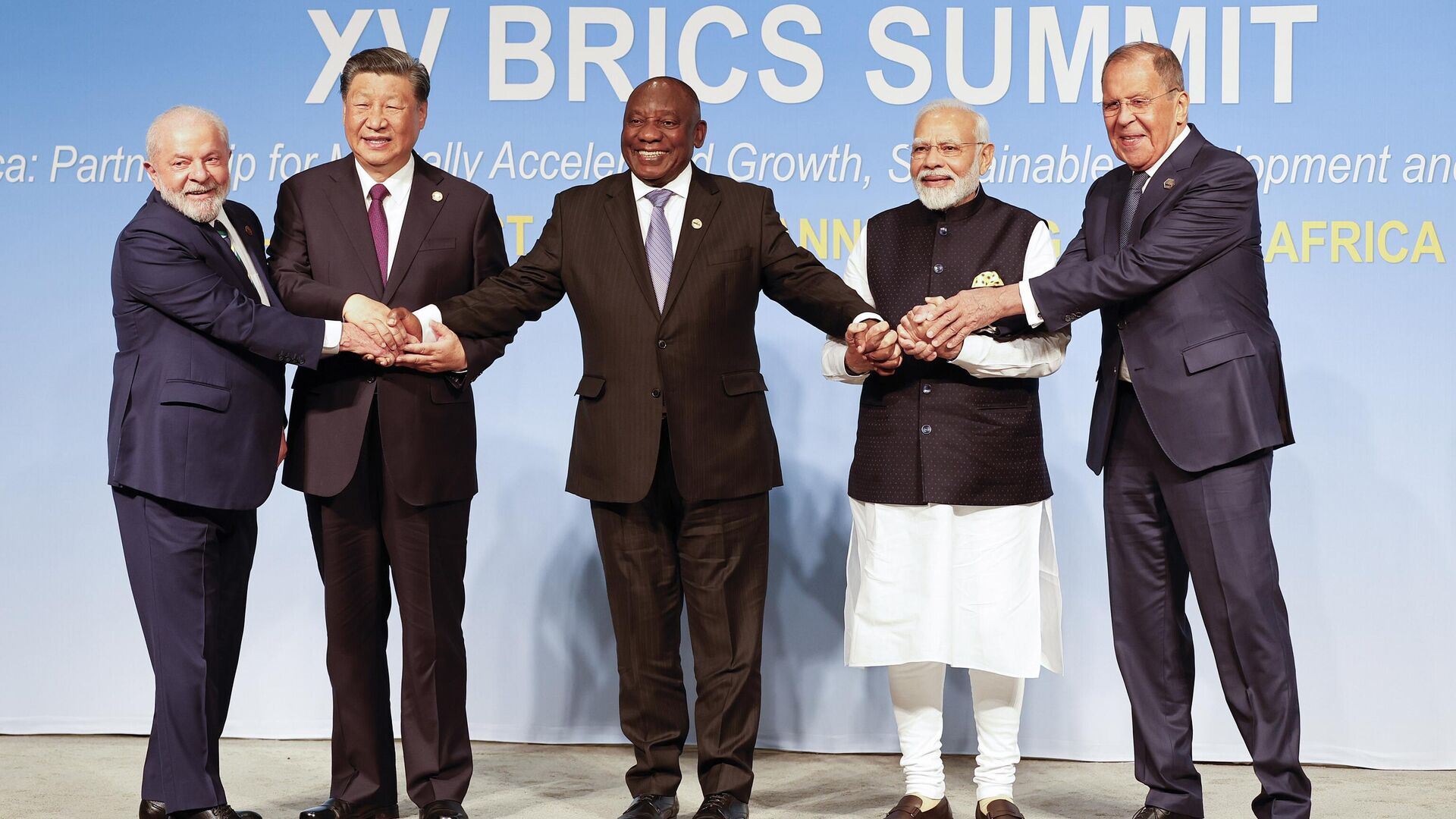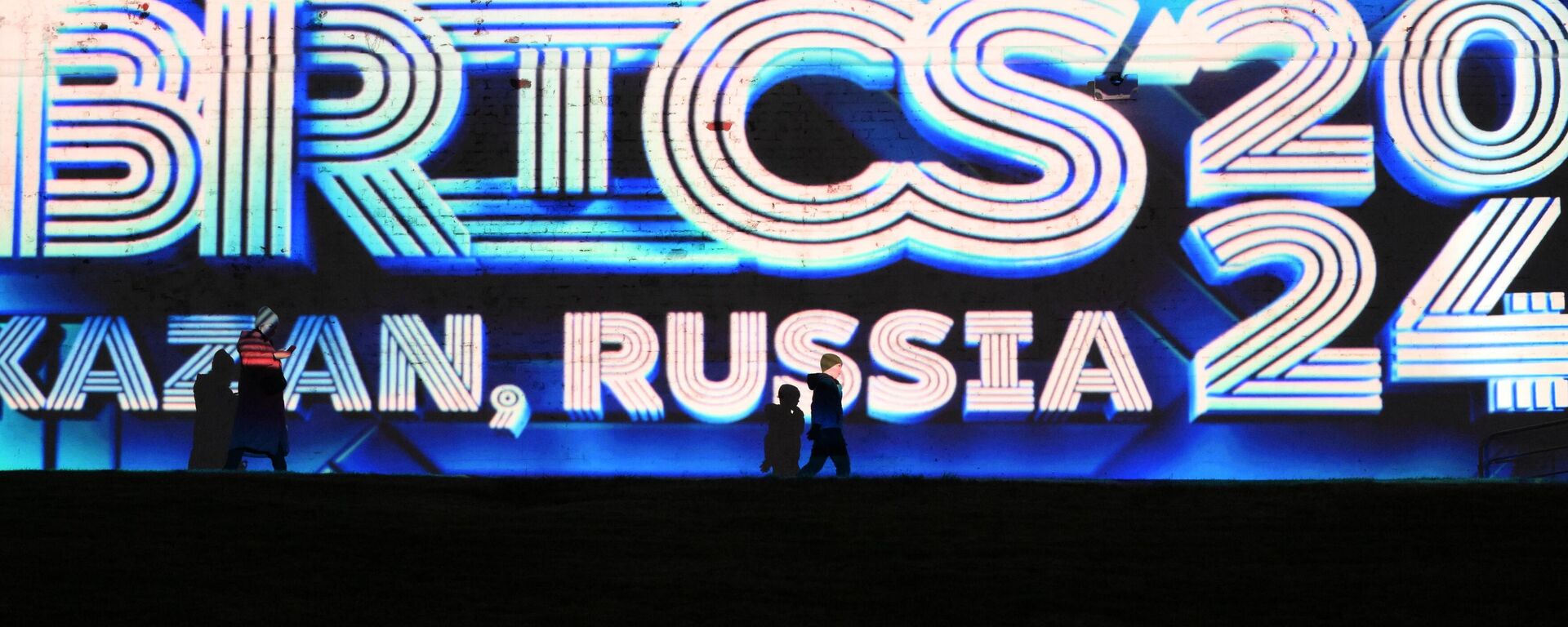https://sputniknews.in/20241022/brics-seeing-clout-strengthen-across-the-globe-8302568.html
BRICS Seeing Clout Strengthen Across the Globe
BRICS Seeing Clout Strengthen Across the Globe
Sputnik India
At least 34 nations, including Thailand, Malaysia, Sri Lanka, and Turkiye, have expressed interest in joining BRICS ahead of the summit in Kazan to be held on... 22.10.2024, Sputnik India
2024-10-22T07:46+0530
2024-10-22T07:46+0530
2024-10-22T12:19+0530
sputnik opinion
new development bank (ndb)
global south
world bank
jawaharlal nehru university (jnu)
brics
brics summit 2024
kazan brics summit
brics expansion
india
https://cdn1.img.sputniknews.in/img/07e8/0a/16/8303806_0:160:3073:1888_1920x0_80_0_0_34b54107c4395636dd16d930a3cf0ec1.jpg
The political heft and clout of BRICS are increasing in the global order and that is the main reason behind several nations making a beeline to become members of the highly influential geo-economic bloc, an expert has said.The fact that five new members joined the BRICS last year and 34 new countries wished to be part of it, shows the group's growing clout and political heft in the existing world order, Dr. Rajan Kumar, an associate professor at the Centre for Russian and Central Asian Studies at Jawaharlal Nehru University's (JNU) School of International Studies, told Sputnik india.Moreover, it demonstrates the growing traction of the organisation among Global South nations, as many countries seek a balanced foreign policy, he said. They aim to maintain ties with Western states while also partnering with emerging economies, particularly those in BRICS, which are expected to drive the global economy in the coming decades, Kumar underlined.However, an increased number of members in the bloc could complicate the decision-making process, as BRICS operates on a consensus basis. That's why, Russia is supporting the idea of partner countries, which means that before anyone becomes a member, nations would be accorded the status of a partner before they are considered for a full membership, the strategic affairs commentator reckoned.The key initiative emerging from BRICS is BRICS Pay, described by Kumar as an alternative banking system to SWIFT, from which Russia was cut off following the Special Military Operation in Ukraine.While it is an alternative to SWIFT, BRICS Pay is vastly different from it, he elaborated. For example, previously all the currencies were linked to the US dollar but BRICS Pay is linked to something similar to a blockchain, which is extensively used in cryptocurrency. Hence, the introduction of this form of digital currency, where countries will have the flexibility to tie up with their national currencies instead of the greenback.Moreover, BRICS has created parallel institutions like the New Development Bank (NDB) headquartered in Shanghai and the Contingency Reserve Arrangement (CRA), Kumar highlighted.Unlike the International Monetary Fund (IMF) and the World Bank provide financial assistance with conditionalities, particularly by asking countries to introduce neo-liberal policies, that isn't the case with NDB, the international relations pundit asserted.
https://sputniknews.in/20241021/why-is-the-brics-summit-in-kazan-significant-8298642.html
global south
india
russia
china
brazil
Sputnik India
feedback.hindi@sputniknews.com
+74956456601
MIA „Rossiya Segodnya“
2024
Pawan Atri
https://cdn1.img.sputniknews.in/img/07e6/0c/13/139630_147:0:831:684_100x100_80_0_0_8fa2b25903e7787fe6a2698552c167df.png
Pawan Atri
https://cdn1.img.sputniknews.in/img/07e6/0c/13/139630_147:0:831:684_100x100_80_0_0_8fa2b25903e7787fe6a2698552c167df.png
News
en_IN
Sputnik India
feedback.hindi@sputniknews.com
+74956456601
MIA „Rossiya Segodnya“
Sputnik India
feedback.hindi@sputniknews.com
+74956456601
MIA „Rossiya Segodnya“
Pawan Atri
https://cdn1.img.sputniknews.in/img/07e6/0c/13/139630_147:0:831:684_100x100_80_0_0_8fa2b25903e7787fe6a2698552c167df.png
new development bank (ndb), global south, world bank, jawaharlal nehru university (jnu), brics, brics summit 2024, kazan brics summit , brics expansion, india, russia, china, brazil, swift system
new development bank (ndb), global south, world bank, jawaharlal nehru university (jnu), brics, brics summit 2024, kazan brics summit , brics expansion, india, russia, china, brazil, swift system
BRICS Seeing Clout Strengthen Across the Globe
07:46 22.10.2024 (Updated: 12:19 22.10.2024) At least 34 nations, including Thailand, Malaysia, Sri Lanka, and Turkiye, have expressed interest in joining BRICS ahead of the summit in Kazan to be held on October 22-26.
The political heft and clout of BRICS are increasing in the global order and that is the main reason behind several nations making a beeline to become members of the highly influential geo-economic bloc, an expert has said.
The fact that five new members joined the BRICS last year and 34 new countries wished to be part of it, shows the group's growing clout and political heft
in the existing world order,
Dr. Rajan Kumar, an associate professor at the Centre for Russian and Central Asian Studies at
Jawaharlal Nehru University's (JNU) School of International Studies, told
Sputnik india.
Moreover, it demonstrates the growing traction of the organisation among Global South nations, as many countries seek a balanced foreign policy, he said. They aim to maintain ties with Western states while also partnering with emerging economies, particularly those in BRICS, which are expected to drive the global economy in the coming decades, Kumar underlined.
"So from that perspective, BRICS has emerged as a very powerful organisation that is attracting a large number of Middle-range and emerging powers from Asia, Africa, and Latin America. Interestingly, even Turkiye, a NATO member, wants to join it. This goes on to say how important this grouping has become as an institution of global governance. Also, it conveys the credibility of BRICS," Kumar stated.
However, an increased number of members in the bloc could complicate the decision-making process, as BRICS operates on a consensus basis. That's why, Russia is supporting the idea of partner countries, which means that before anyone becomes a member, nations would be accorded the status of a partner before they are
considered for a full membership, the strategic affairs commentator reckoned.
The key initiative emerging from BRICS is BRICS Pay, described by Kumar as an alternative banking system to SWIFT, from which Russia was cut off following the Special Military Operation in Ukraine.
"This would allow BRICS member states to transfer money, and exchange currencies without relying on the Western-backed SWIFT mechanism. In addition to that, they would be able to settle their trade payments through this system," Kumar explained.
While it is an alternative to SWIFT, BRICS Pay is vastly different from it, he elaborated. For example, previously all the currencies were linked to the US dollar but BRICS Pay is linked to something similar to a blockchain, which is extensively used in cryptocurrency. Hence, the introduction of this form of digital currency, where countries will
have the flexibility to tie up with their national currencies instead of the greenback.
Moreover, BRICS has created parallel institutions like the
New Development Bank (NDB) headquartered in Shanghai and the
Contingency Reserve Arrangement (CRA), Kumar highlighted.
Unlike the
International Monetary Fund (IMF) and the World Bank provide financial assistance with conditionalities, particularly by asking countries to introduce neo-liberal policies, that isn't the case with NDB, the international relations pundit asserted.
"With NDB and CRA starting to finance several projects all over the Global South, they will emerge as powerful financial alternatives to the IMF and World Bank. In this scenario, the IMF and the World Bank will have two choices – either they give more powers to these BRICS states or gradually fade into insignificance. In a nutshell, the NDB and CRA do not necessarily disrupt the IMF and the World Bank but certainly challenge the dominance of these institutions," he concluded.



